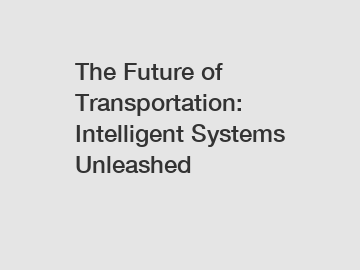The Future of Transportation: Intelligent Systems Unleashed
The Future of Transportation: Intelligent Systems Unleashed.
In recent years, there has been a significant shift in the way we think about transportation. With the advent of intelligent systems, the future of transportation looks promising. These systems, powered by artificial intelligence and advanced technology, have the potential to revolutionize the way we travel. In this article, we will explore the origins, progression, and significance of intelligent transportation systems and their impact on our lives.
The origins of intelligent transportation systems can be traced back to the advancements in artificial intelligence and sensor technology. With the development of sophisticated algorithms and machine learning techniques, vehicles can now gather and process vast amounts of data in real-time. This data includes information about traffic flow, road conditions, and even the behavior of other vehicles on the road. By analyzing this data, intelligent systems can make informed decisions and optimize transportation networks to improve efficiency and safety.

The progression of intelligent transportation systems has been remarkable. Initially, these systems were limited to research and development labs. However, with the increasing availability and affordability of sensors, GPS technology, and connectivity, they are now being deployed on a larger scale. Driver assistance systems, such as adaptive cruise control and lane departure warning, have become commonplace in many vehicles. These systems not only make driving easier and safer but also pave the way for fully autonomous vehicles.
The impact of intelligent transportation systems is far-reaching. With the ability to collect and analyze data in real-time, these systems can optimize traffic flow, reduce congestion, and improve road safety. For example, the integration of intelligent systems with traffic control infrastructure can enable dynamic signal sequencing, which adjusts traffic light timings in real-time based on the current traffic conditions. This can significantly reduce travel times and fuel consumption, leading to a more sustainable transportation system.
Furthermore, the deployment of autonomous vehicles powered by intelligent systems can have profound implications. Beyond the convenience of hands-free driving, autonomous vehicles can enhance mobility for those who are unable to drive, such as the elderly or people with disabilities. They can also reduce the number of accidents caused by human error, ultimately saving lives. Additionally, by embracing shared autonomous mobility, we can optimize the use of vehicles and reduce the need for private car ownership, leading to reduced traffic and environmental impact.
In conclusion, the future of transportation lies in intelligent systems. These systems, driven by artificial intelligence and advanced technology, have the potential to transform our transportation networks. From optimizing traffic flow and enhancing road safety to enabling autonomous driving and shared mobility, the possibilities are immense. As we continue to advance in technology, it is crucial to embrace the potential of intelligent transportation systems and work towards a future that is efficient, sustainable, and safe.
Want more information on indoor smd screen, chainzone led display Supplier, led speed limit sign? Feel free to contact us.


